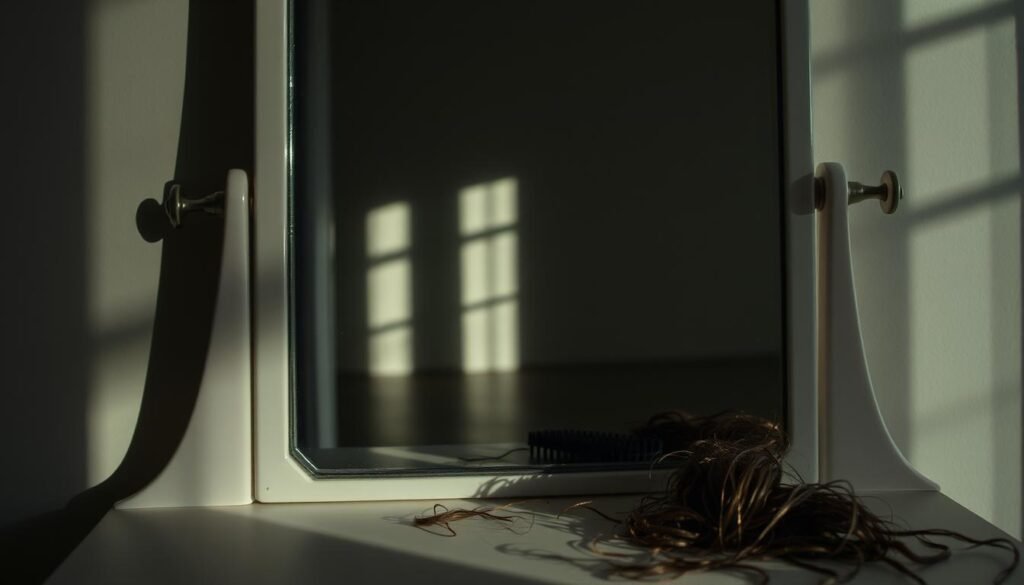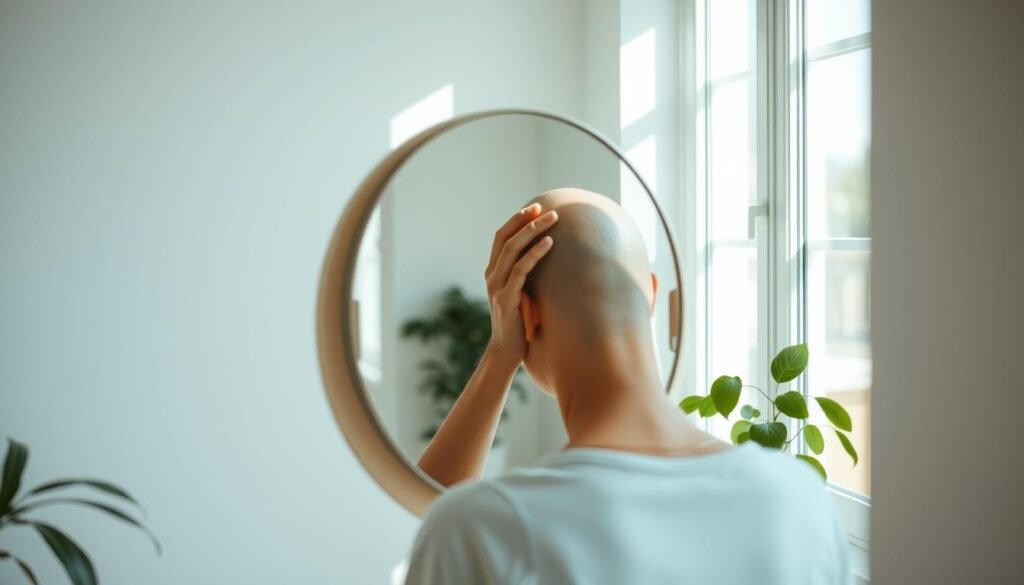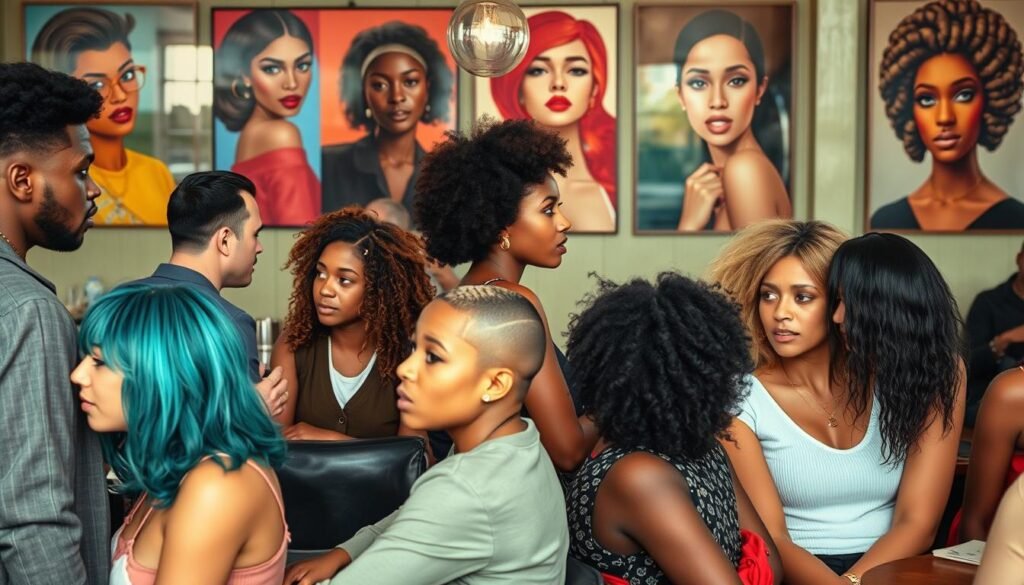About half of all men and 40% of women deal with hair loss by age 50. It’s a common problem that affects many people. Hair loss does more than change how we look. It deeply impacts how we feel about ourselves.
Dealing with hair loss is not just physical. It’s an emotional journey, too. Losing hair can make us feel differently about ourselves. It affects how we think others see us. We’ll explore how hair loss changes the way we view ourselves and its effects on our emotions.
Key Takeaways
- Nearly half of men and women experience significant hair loss by age 50.
- The emotional effects of hair loss can dramatically impact self-esteem.
- Hair loss isn’t just a physical change, but a psychological challenge.
- Understanding one’s self-image is crucial in coping with baldness.
- Support and community play essential roles in managing hair loss.
Understanding Hair Loss and Its Causes
Hair loss happens for many reasons. Knowing why is key. Causes of hair loss include genetics, hormonal changes, health issues, and the environment.
A common type is androgenetic alopecia, also known as pattern baldness. It’s tied to genetics and hormone shifts. It makes hair thin over time.
Alopecia areata is different. It causes sudden hair loss in spots. This happens when the immune system attacks hair cells, creating visible bald areas.
Telogen effluvium comes from stress, medicine, or hormonal shifts. This leads to more hair falling out. It causes noticeable hair thinning.
- Genetic Factors: Family history matters a lot.
- Hormonal Changes: Things like pregnancy, menopause, or thyroid problems play a role.
- Medical Conditions: Illnesses like lupus or diabetes can cause hair to fall out.
- Environmental Factors: Air pollution and harsh hair treatments affect hair health.
Knowing these hair thinning reasons lets people understand their hair loss. It’s the first step towards dealing with it effectively, as we’ll see next.
Psychological Impact of Hair Loss
Hair loss can bring about deep emotional responses. Feelings of sadness, frustration, and anxiety often come with it. The effects of hair thinning are deeply felt by many. They struggle with their changing looks and how others see them. Hair loss can lead to emotional distress, affecting many parts of life. It may cause someone to pull back socially and feel isolated.
Emotional Consequences of Thinning Hair
Dealing with thinning hair brings many emotions. People often feel embarrassed, especially around others. They might worry about being judged, which can make them more self-aware. How we look strongly ties to our self-esteem. So, hair loss can really harm our mental health.
Impact on Personal Identity
Hair is crucial in defining who we are. For many, it’s more than a physical feature. It’s a part of their self-image and how society sees them. Losing hair can force a person to rethink their self-view. This change can impact how we interact and relate to others. It might cause us to worry about how we’re seen, making us question our identity.

Studies show a link between hair loss and psychological issues like Body Dysmorphic Disorder (BDD). Treating hair loss requires careful consideration of these psychological effects. By understanding hair loss’s deeper effects, we can better support those affected. For more info, check out studies on the psychological impact of hair loss.
The Connection Between Hair Loss and Mental Health
Hair loss can lead to big challenges, especially with mental health. This is because losing hair deeply affects how we see ourselves. When we notice our hair changing, we might feel less confident. This can make us emotionally upset.
How Hair Loss Affects Self-Esteem
Seeing our hair thin or fall out can make us feel insecure. Hair is often a big part of who we are. If we’re worried about going bald, we might avoid going out. We fear what people will think. This fear can make us feel lonely and sad in different ways:
- Stepping back from hanging out because we feel ashamed.
- Being very critical of ourselves and thinking negative thoughts.
- Not trying new things, like dating or asking for a job promotion.
Linking Hair Loss Anxiety to Mental Well-being
Hair loss anxiety can make mental health issues worse. People dealing with hair loss stress may become more anxious. This anxiety can lead to depression and fear of social situations. It turns into a hard cycle of feeling bad. For some, getting help is the best way to deal with these problems.
| Emotional Effects | Possible Responses |
|---|---|
| Feeling more anxious about being around people | Choosing to stay home to not feel exposed |
| Having trouble in personal relationships | Hiding feelings and avoiding honest talks |
| Feeling bad about oneself | Turning to not-so-good ways of coping |
Coping with Baldness Emotionally
Dealing with baldness emotionally means understanding the mind changes that come with losing hair. Building emotional strength is key here. People who lose their hair can gain power by changing their view. They see hair loss as a chance to grow and find confidence.
Accepting new selves is also important in this journey. Many find their value goes beyond looks. Being kind to oneself is essential, letting them accept feelings without blame. This helps grow a healthier way of thinking.
To handle hair loss better, finding useful strategies is helpful. Having people to support us brings comfort in hard times. Joining groups, online or face-to-face, links us with others in the same boat. It creates a feeling of belonging.
It’s good to set real goals and recognize every success, big small. Celebrating these wins boosts confidence and promotes a positive view. Even though it’s tough, getting used to hair loss opens up acceptance and finding oneself.

Social Perceptions and Hair Loss
Societal views on hair loss strongly affect how people see themselves. Feeling pressured to meet beauty standards is tough. This is especially true in a society where thick hair is often seen as beautiful. The pressure can make people who are losing their hair feel bad about themselves. It can lead to distress and poor self-image.
Societal Pressures Related to Appearance
Studies reveal that society’s views can stigmatize hair loss. Many, especially women, worry about how they look because of these standards. As beauty ideals change, those with hair loss may find self-acceptance hard. They often compare themselves to others. This focus on hair can hurt their self-esteem deeply.
The Role of Media in Shaping Self-Image
Media’s portrayal of beauty makes dealing with hair loss harder. Ads and shows often feature ideals that include full hair, making some doubt their value. Such images can deepen negative feelings by not showing real-life diversity. To understand hair loss’s psychological side, check out research on androgenetic alopecia’s impact. For information on hormones and hair loss, see this link.

Techniques for Managing Emotional Distress from Hair Loss
Experiencing hair loss can bring strong feelings. People look for ways to handle the sadness and stress it causes. Mindfulness strategies offer practical help and can build emotional strength. By using these methods, people can feel better and accept their situation more fully.
Mindfulness and Stress Reduction Strategies
Mindfulness helps people deal with their feelings about losing hair. It includes meditation, deep breathing, and relaxing the muscles slowly. These can lower stress and help people feel emotionally stable. Doing these things regularly keeps people in the moment. This stops them from worrying too much about how they look.
- Meditation: A practice that helps focus on breathing and letting go of negative thoughts.
- Deep Breathing: This technique calms stress and helps people relax more easily.
- Journaling: Writing thoughts and feelings can help sort through emotions and find what bothers them.
Seeking Professional Help: Therapy Options
If the emotional pain is too much, getting help from a therapist is a good idea. Therapy gives a safe space to talk about feelings and find ways to deal with them. There are different types, like cognitive-behavioral therapy (CBT), which changes harmful thought habits, and group therapy, which lets people support each other by sharing their experiences.
| Type of Therapy | Focus | Benefits |
|---|---|---|
| Cognitive Behavioral Therapy (CBT) | Alter negative thought patterns | Improves self-esteem and coping skills |
| Group Therapy | Sharing experiences with others | Builds community and support |
| Mindfulness-Based Stress Reduction (MBSR) | Enhances awareness and acceptance of feelings | Reduces anxiety and promotes emotional resilience |
Support Systems for Individuals Experiencing Hair Loss
Losing hair can be a tough journey. It helps to have people who understand what you’re going through. Being part of a community with similar experiences can be very supportive. It helps you feel less alone and supports emotional healing.
The Importance of Community and Sharing
A strong support system makes dealing with hair loss easier. Connecting with a community is very important. Joining support groups helps you find comfort and get useful advice. For more tips on dealing with the emotional side of hair loss, check out this resource.
Building a Supportive Network
To build a support network, you have to be active. Look for local groups or online communities dealing with hair loss. Making friends who face the same challenges can make you feel included. Here’s how you can start:
- Attend local events or workshops focused on hair loss and wellness.
- Join online forums that cater to discussions about hair loss.
- Participate in social media groups specifically for individuals affected by hair loss.
- Initiate conversations with others who have faced similar experiences.
Personal Stories: Resilience and Recovery
Exploring personal stories of hair loss sheds light on the resilience developed during these journeys. These tales inspire us. They show how individuals turn tough experiences into tales of recovery and strength.
Inspirational Accounts of Coping with Hair Loss
Many have shared their personal hair loss stories, highlighting their different paths to acceptance and healing. Their paths often include:
- Building confidence through open talks about hair loss.
- Connecting with supportive groups that offer understanding.
- Finding new hairstyles or looks that express who they are.
- Using creative ways to tell their stories.
The Journey Toward Acceptance
The path to resilience through hair loss is transformative. It teaches many that their value goes beyond looks. This journey’s key points include:
- Acknowledging feelings and being okay with vulnerability.
- Redefining beauty based on what matters to them.
- Finding therapeutic activities for mental health.
- Helping others by sharing their resilience stories.
These stories of hair loss highlight a shared resilience. They stress personal growth and togetherness. Thus, individuals find a deep strength that lets them face life, despite hair loss challenges.
Conclusion
Going through hair loss is tough, impacting how we see ourselves and feel inside. This talk has shown how losing hair affects our self-respect and mental state. It’s key to grasp the emotional impact as we deal with hair loss.
People dealing with hair loss often find inner strength. They learn ways to bounce back emotionally. Having support and connecting with others who understand is vital. It helps people feel they belong and are accepted.
Talking openly about hair loss helps fight its stigma. This lets people express their struggles and seek support. Being aware and compassionate about hair loss helps individuals accept their situation. It encourages them to grow from their experiences and see challenges as chances to improve.